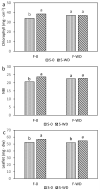Soil and Foliar Applications of Wood Distillate Differently Affect Soil Properties and Field Bean Traits in Preliminary Field Tests
- PMID: 36616250
- PMCID: PMC9823333
- DOI: 10.3390/plants12010121
Soil and Foliar Applications of Wood Distillate Differently Affect Soil Properties and Field Bean Traits in Preliminary Field Tests
Abstract
Natural products such as wood distillate (WD) are promising alternatives to xenobiotic products in conventional agriculture and are necessary in organic farming. A field study gave insight into the effectiveness of WD applied as foliar spray (F-WD), soil irrigation (S-WD), and their combination as growth promoters for field beans. The soil fertility and quality parameters, plant growth, nutrient uptake, and resource partitioning within plants were evaluated. In a pot trial, we tested the effect of S-WD on root nodule initiation and growth. S-WD increased DOC and microbial biomass by approximately 10%, prompted enzyme activities, and increased nitrate and available phosphorus in soil, without affecting the number and growth of nodules in field beans. In contrast, the F-WD slightly reduced the DOC, exerted a lower stimulation on soil enzymes, and lowered the soil effect in the combined distribution. In field beans, the F-WD reduced the stem height but increased the number of pods per stem; S-WD increased the N and P concentrations of leaves and the N concentration of the pods. Moreover, all WD treatments retarded plant senescence. The WD revealed itself to be promising as a growth promoter for grain legumes, but further research is needed to understand the interference between the combined soil and foliar applications.
Keywords: Vicia faba var. minor beck; flower fertility; nitrate; nodules; phosphorus; soil enzymes; wood vinegar.
Conflict of interest statement
The authors declare no conflict of interest.
Figures



References
-
- Grewal A., Abbey Gunupuru L.R. Production, prospects and potential application of pyroligneous acid in agriculture. J. Anal. Appl. Pyrolysis. 2018;135:152–159. doi: 10.1016/j.jaap.2018.09.008. - DOI
-
- Ma X., Wei Q., Zhang S., Shi L., Zhao Z. Isolation and bioactivities of organic acids and phenols from walnut shell pyroligneous acid. J. Anal. Appl. Pyrolysis. 2011;91:338–343. doi: 10.1016/j.jaap.2011.03.009. - DOI
-
- Simma B., Polthanee A., Goggi A.S. Wood vinegar seed priming improves yield and suppresses weeds in dryland direct-seeding rice under rainfed production. Agron. Sustain. Dev. 2017;37:56. doi: 10.1007/s13593-017-0466-2. - DOI
LinkOut - more resources
Full Text Sources

